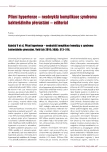Universities need to have high quality education as well as an effective quality control of their students’ (products’) knowledge and skill base
Authors:
Z. Adam 1; M. Komenda 2; M. Doubek 1; M. Krejčí 1; M. Tomíška 1; D. Schwarz 2; J. Vorlíček 1
Authors‘ workplace:
Interní hematoonkologická klinika Lékařské fakulty MU a FN Brno, pracoviště Bohunice, přednosta prof. MU Dr. Jiří Vorlíček, CSc. 2Institut biostatistiky a analýz Lékařské a Přírodovědecké fakulty MU Brno, ředitel doc. RNDr. Ladislav Dušek, Ph. D.
1
Published in:
Vnitř Lék 2010; 56(6): 624-628
Category:
65th Birthday - Petr Svacina, MD
Overview
In order for the schools of medicine to produce high quality physicians, they have to provide high quality education as well as they must ensure that knowledge building is taking place in the course of the programme and that the students whose efforts and/or abilities do not allow achievement of the required criteria are eliminated. Exams used to be the standard quality control tool. However, current information technologies allow doubling-up of this control; retaining the traditional examinations but preceding them with the requirement to complete multiple-choice tests. The text summarizes our experience with examining the students’ mental presence during teaching with tests and our plans for the combined form of exit control using tests, completion of which will be prerequisite to admission to the exam itself. We do not believe that tests should completely replace exams but we do believe that the requirement to pass the exam should only take place following previous successful completion of a test. This is achievable if we manage to establish a computer teaching room, i.e. examination room, and transform a vast number of questions into high quality multiple choice tests.
Key words:
university education – examination of knowledge necessary to pass a subject area
Labels
Diabetology Endocrinology Internal medicineArticle was published in
Internal Medicine

2010 Issue 6
-
All articles in this issue
- Pulmonary hypertension – unusual complication of the bacterial overgrowth syndrome – editorial
- Is there circadian variation of big endothelin and NT‑proBNP in patients with severe congestive heart failure?
- The normalized smoothness index and parametric population RDH index of telmisartane in patients with newly diagnosed hypertension and metabolic syndrome
- Essential thrombocythaemia and other myeloproliferative disorders with thrombocythaemia treated with Thromboreductin. A report from the database of Register for the 1st quarter of 2010
- Pulmonary hypertension – unusual complication of haemolysis and the bacterial overgrowth syndrome
-
Hyperlipoproteinemie a dyslipoproteinemie I.
Klasifikace, diagnostika, kardiovaskulární, kardiometabolické a reziduální riziko - BRNO Register 2: post-myocardial infarction pharmacotherapy
- Different courses of recurrent or multisystem Langerhans cells histiocytosis in adults – description of 22 cases from one centre
- Sepsis and the septic shock in oncological or other immunocompromised patients
- A psychological perspective on the problems faced by the oncology patients and their care teams
- Antibiotics and probiotics in acute pancreatitis
- The value of various imaging techniques in diagnosing and monitoring the disease activity of multiple myeloma
- Contribution to the evaluation of serum levels of selected biological parameters in monoclonal gammopathy of undetermined significance and in individual clinical stages of multiple myeloma
- Continuous monitoring of tissue glucose
- The value of baroreflex sensitivity for cardiovascular risk stratification in hypertensives
- Prevention and treatment of extremitovascular ischemic disease
- Changes in lipoprotein spectrum in patients with the diagnosis of extremito-vascular ischemic disease
- Universities need to have high quality education as well as an effective quality control of their students’ (products’) knowledge and skill base
- Internal Medicine
- Journal archive
- Current issue
- Online only
- About the journal
Most read in this issue
- Sepsis and the septic shock in oncological or other immunocompromised patients
-
Hyperlipoproteinemie a dyslipoproteinemie I.
Klasifikace, diagnostika, kardiovaskulární, kardiometabolické a reziduální riziko - Essential thrombocythaemia and other myeloproliferative disorders with thrombocythaemia treated with Thromboreductin. A report from the database of Register for the 1st quarter of 2010
- Different courses of recurrent or multisystem Langerhans cells histiocytosis in adults – description of 22 cases from one centre
